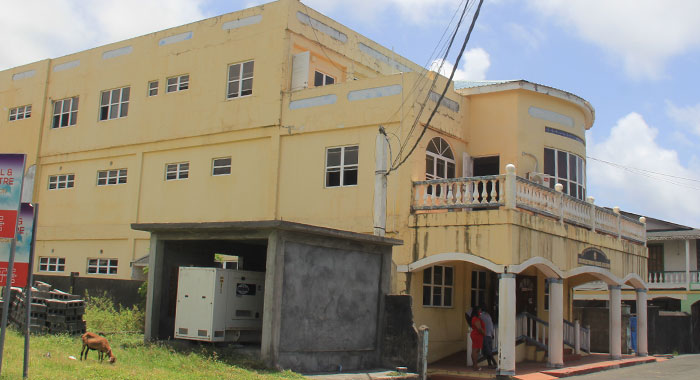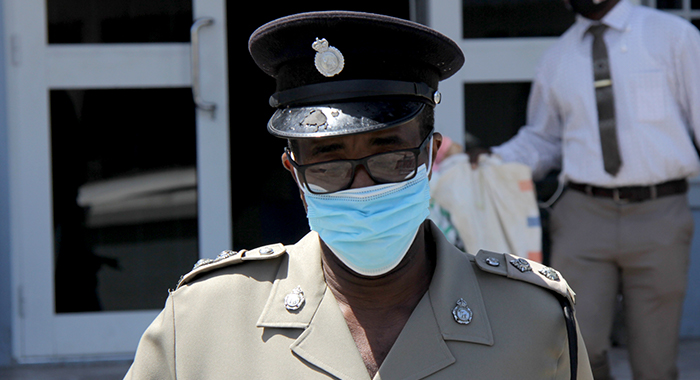The trial of the former police officer accused of stealing a number of firearms and rounds of ammunition from the Georgetown Police Station last year began on Tuesday, with the defence counsel accusing an inspector of police of having “no clue” about what was taking place at the police outpost.
“Inspector, with greatest respect, you have no clue what was going on at Georgetown Police Station,” the lawyer, Grant Connell said during his cross examination of Inspector Providence.
“I would not agree,” the officer responded during the trial before Zoila Ellis-Browne at the Calliaqua Magistrate’s Court.
Zackrie Latham, 25, of New Grounds, a former police constable, is being tried on charges of official corruption, burglary, sale of firearms without a dealer’s licence, sale of ammunition without a dealer’s licence, possession of a firearm without a licence, possession of ammunition without a licence, possession of a prohibited weapon without authorisation of the minister, and possession of criminal property.
He allegedly committed the offences between Jan. 31 and June 17, 2021, at Georgetown, Diamonds, Sion Hill and Kingstown.
Crown Counsel Maria Jackson-Richards is the prosecutor.
In his evidence in chief, Providence told the court that as result of the April 2021 explosive eruption of La Soufriere volcano, officers in Sandy Bay and Owia vacated their stations, and moved to the Georgetown Police Station.
The officer brought with them their weapons and ammunition. They were two Glock 9mm pistols, serial number LNL 143 and 144, and rounds of 9mm ammunition from Owia Police Station and the Sandy Bay Owia Police Station brought two Glock 9mm pistols — LNL 156 and LNL 157 — and 390 rounds of 9mm ammunition.
The weapons and ammunition from both stations were under the charge of the sergeant.
Providence said that he left the Georgetown Police Station for his residence on June 1, leaving everything intact and Sergeant 445 Messiah in charge.
Providence returned to work on June 3 at 11:45 a.m. and Superintendent Samuel, the divisional commander and Assistant Superintendent Francois, the second in command of the division, were already on the compound. Sergeant 163 Lett was the sergeant on duty.
“At 4:15 p.m., I was summoned upstairs to the armoury. On arrival, I met Superintendent Samuel and Sergeant 163 Lett. I was told something in relation to the armoury and I observed that a strip of wood to the armoury appeared to be forced apart, leaving the lock exposed.”
Providence was not allowed to say what he was told, because the hearsay rule bars witnesses from telling the court certain things not said in the presence of the defendant.
The inspector said that he, Lett and I went into the armoury and he observed it appeared to have been ransacked.
“An inventory was done and we discovered that three weapons assigned to the Georgetown Police Station were missing: LNL 151, LNL 155, two Glock 9mm pistols and also missing was one M4 [rifle], serial number W877775.”
Providence said that during the check, they found that a Glock 9 pistol, serial number LNL 144, which was assigned to the Owia Police Station, was also missing.
The check also discovered that a quantity of ammunition was missing from the armoury.
A further check of Francois’ office revealed that his service pistol was also missing.
Providence said that the weapons were for the protection of officers as they went about their duty and also for the protection of the public. They were issued to officers daily.
“I am very familiar with all of the weapons at the station. I have examined all of them before and when I took over on March 15, I … examined them there and then.”
He told the court that he also inspected the weapons from Owia and Sandy Bay, as they were turned over to him when the officers evacuated and he, in turn, handed them over to the sergeant in charge.
Providence said that before handing over the weapon to the sergeant, he verified their serial numbers.
In explaining the procedure for issuing a firearm, Providence said the station records in the weapons register the serial number of the weapon issued, the amount of ammunition issued and the issuing officers as well as the receiving officer, both of whom sign the register. They also record the date and time of issue. He said that ammunition is issued in a magazine.

Check to see is you checked
During cross examination, Providence said he has been a police officer for 25 years.
He works at the station Monday to Friday, arriving at 8 a.m., and leaving between 4 p.m. and 6 p.m. When he left the station on June 1, Sergeant Messiah was in charge.
The inspector said he could not recall on which of the days he checked the contents of the armoury or the records
“During the volcano period, we were doing a lot of movements, so we had to do a lot of checks,” Providence said.
“Where can we check to check if you checked?” Connell asked regarding the content of the armoury.
“Probably it’s the diary,” the inspector replied. “The station diary.”
“So, I can say for a fact that if procedure is followed, if you checked the armoury, the records will show,” the lawyer replied.
“That is true,” Providence responded.
“So I can say quiet safety that since you checked the armoury and the records don’t show, that procedure is not followed at Georgetown Police Station,” the lawyer said.
“I would not say that. I would not agree with you.”
“Well, let me narrow it down. Inspector Providence does not follow procedure.”
“That is not true,” Providence responded.
The inspector told the court that an officer of inspector rank or above is a travelling officer, responsible for checking stations across the country and ensure that records are being kept and procedures followed.
He said that at the time, he was one of three travelling officers at Georgetown Police Station, the other two being the superintendent and the assistant superintendent.
The inspector said that there is an official visitor’s register at the station in which travelling officers make notes.
He could not recall when was the last time before June 3 that he made notes in the diary in his capacity as travelling officer.
“How many times a year do you wear the hat of travelling officer and inspect Georgetown Police Station?”
“That is something that is done at your discretion,” Providence said.
He later said that he inspects the station everyday in his capacity as a travelling officer.
“So, if everyday you do that in your capacity as travelling officer, if procedure is followed, you should fill out the visitors diary and say what your findings are?”
Providence said that that was the case but told the court that if the diary were sent for, it would not contain his notes.
“So, again, you agree that you didn’t follow procedure,” Connell said.
“I wouldn’t say so,” he said. He further told the court that a travelling officer would make a note “if you check and there are discrepancies” but said he had made no notes up to June 3.
‘I can say what should be there’
The inspector said it would not be correct, as the lawyer had suggested, that in his 25 years as an officer, he didn’t find any discrepancies in the armoury up to June 3, 2021
He told the court that he did not know how much ammunition was in the armoury prior to his departure from the station on June 1.
He said the amount of weapons and ammunition in the armoury would be noted in the station diary but he made no such note.
“So it would be correct to say up until the 3, when you left the station, there was no written record of what is in the armoury?’ Connell said.
“There was record,” Providence said, and further told the court that he left the station around 2 a.m. on June 4.
He said that Sergeant Lett was the first person to discover the firearms and ammunition missing.

The inspector said he would not be able to say how many Glock pistols, M4 rifles or rounds of ammunition were in the armoury before he left.
“So the most you can say as the travelling officer inspecting the station every day is that those were supposed to be there?” Connell asked.
“Yes,” Providence responded.
He told the court he did not know about a firearm bearing serial number W876851, which was quoted by the lawyer.
“First time I am hearing that serial number,” Providence said.
“Let me try and update the travelling officer. There were two M4 rifles at the Georgetown Police Station. One you say was missing. And the other one, any idea where it is?”
“It was out on duty,” Providence said.
He said that on his last check there were 102 rounds of ammunition for the M4 rifles.
He could not say how many Glock pistols were in the armoury, telling the court,
“I can say what should be there: five pistols.”
It was at this point that the lawyer first accused the senior police officer of not having a clue what was going on at the Georgetown Police Station.
‘That is misinformation’
Providence did not know if, as of June 3, the Glock pistols were in boxes or not.
“Inspector, I am beginning to believe that you never went into the armoury,” the lawyer said.
“Not true.”
He did not agree that there were six boxes for Glock pistols in the armoury, as the lawyer put it to him.
“You don’t have a clue what’s going on at Georgetown Police Station. Let me educate you,” Connell said, adding that the six pistols in the armoury were LNL 152, LNL 150, LNL 154, LNL 155, LNL 151, and LNL153.
Providence said this was not so.
He said he was not present when the armoury was checked after the firearms and ammunition were found to be missing.
“When you were summoned and you looked in the armoury, you saw no firearm, no ammunition?
“I saw ammunition for sure. I can’t recall if I saw any pistols,” Providence said. “Sergeant Lett and Superintendent Samuel were present. Nothing was removed in my presence. This was about 4:15 p.m.”
The lawyer put it to the inspector that there should have been 10 Glock pistols in the armoury.
“That is not accurate,” Providence responded.
“And, in fact, contrary to what you said, there were 10 boxes that held 10 pistols,” the lawyer continued.
“That is misinformation. That is not accurate.”
The lawyer further suggested to Providence that when he “peeped” in the armoury, there were 10 empty boxes that usually hold the Glock pistols.
“I don’t agree,’ Providence said.
“Well, you peep; you won’t know,” the lawyer commented.

ASP keeps his firearm in his office?
Providence told the court that he was present when personnel from the Criminal Records Officer, including Corporal 743 Raycon John, arrived to process the scene.
The inspector said that the corporal documented what was in the armoury.
He said that there were empty pistol boxes from the Georgetown station but he did not know how many, nor could he say how many from Sandy Bay.
The inspector said he had “no reason to doubt” that there were two empty boxes for pistols from the Owia Police Station.
Providence told the court that the last time he inspected the station and made notes was probably around December, before going on vacation. He returned from vacation early in January.
Over the last two month, the last time he inspected the station was about two weeks ago, he told the court.
“Very well. Finally doing your job,” the lawyer said. “So you will tell this magistrate how many Glock pistols in the armoury now.”
The inspector said six pistols and two M4 rifles. He said that of the six serial numbers that the lawyer had given — LNL 150, LNL 152, LNL 153, LNL 143, and LNL 154 — were at Georgetown Police Station.
“So five of the 10 that were in the armoury on June 3 are still at the armoury today?” the lawyer said.
Providence confirmed that this was the case.
He said he could not say what was the serial number for the firearm that Francois had.
He said that Francois’ firearm was found to be missing when the armoury was broken into.
“Francois keeps his firearm in the armoury?” Connell asked.
Providence said that checks were made at Francois’ office.
“Francois keeps his firearm in his office?” the lawyer asked.
“At the time of the incident, his firearm was in his office.”
‘You ever see that in your life?’
The inspector said that Francois was off the compound when his firearm was found to be missing.
He said that the assistant superintendent of police did not have a safe in his office. Providence said he did not know where Francois left the firearm. He also did not know if it had been recovered.
He said that the firearm was not one of the 10 mentioned earlier and he was not aware that anyone has been charged in connection with Francois’ service pistol.
The inspector told the court that the armoury currently has several locks, new ones having been added between July and August 2021.
He said that as a travelling officer, he did not make a note of when the locks were changed.
He said that the procedure is that the sergeant on duty keeps the keys to the armoury.
“Where?” the lawyer asked sharply.
“I can’t tell you where. I tell you who has it. I can’t tell you if the sergeant has it in his pocket or desk,” the inspector said, his voice raised.
He said there is no official place where the armoury key is kept.
“Therefore, there is a possibility of the sergeant resting the keys on the desk. There are occasions that you saw that key on the desk.”
Providence said this was not the case. He also said he has never had the key and that a sergeant is always on duty and that sergeant keeps the keys.
“Which diary can one check in the week of June 3 to see what was in the armoury?” the lawyer asked.
“You can check the firearm register.”
The lawyer checked the photocopy of the diary and said that the firearm register shows you what was signed out. “I asked you for the record of the armoury.”
“That’s the record of the armoury,” the inspector said.
The lawyer received the court’s permission to show the copy of the diary to the inspector.
“You ever see that in your life?”
“Of course,” Providence said.
He said that the last time was probably the previous week.
He said there was not part of the diary that the travelling officer signs off on.
Providence said that when a travelling officer passes by a station and looks at the diary, it is to ensure that the weapons are accounted for.
“Tell us, from that book, on June 3, how many firearms were in the armoury. I know you are travelling officer and you will be looking very hard for something you can’t find. All that shows is who sign out for firearm,” the lawyer said.
“That is true,” Providence told the court.
He said there is no record that reflects what is in the armoury on a monthly basis.
He said that the sergeant who issues weapons would know what is in the armoury and whenever there is a “handing over”, an entry is made of what is in the armoury.
“Before the entry is made, all the weapons have to be checked, along with the ammunition,” Providence said.
“So it would be correct to say before each handing over, they check the armoury and count how many firearms and ammunition?” the lawyer asked.
“That is the procedure.”
Providence said there are no cameras in the Georgetown Police Stations and it is correct to say that a person can enter the building from the eastern side, where there is a long wall. One can jump from the wall to the step and go up to the second floor.
“And once you are in the station, you in the station?” the lawyer asked.
“Should be,” Providence said.
The inspector said he was present when Commissioner of Police Colin John arrived at the station on June 3.
The police chief arrived with the Criminal Records Officer personnel.
Providence said John entered the armoury. “I believe it’s after they finished processing.”
‘That’s possible because of the volcano’
The inspector said that when he left the station on June 1, everything was intact.
“During the course of the day, nothing unusual was reported to me.”
He said he knew how the armoury was kept and, therefore, knew it was ransacked when he saw it on June 3.
“How you know it was ransacked?” the lawyer asked.
“I do not know,” Providence said.
“Right, say that nuh man. You don’t know anything,” the lawyer said.
Providence said that when he returned to work it was “not really” his duty to check the armoury.
Providence told the court that the book in which travelling officers write is called an official visitor’s register.
“So if I visit a station, I check and write in that book.”
When last you write in that book for Georgetown?” Connell said.
“Your honour, I am being honest–” Providence was saying when the lawyer interjected, “I want you to be honest. I asked you a simple question. When last you write in the visitor’s book?”
“I can’t tell when last I write in the visitor’s book.”
He said that because he is stationed in Georgetown, “you won’t find me writing in the Georgetown book”.
The lawyer suggested that prior to June 3, the visitor’s book was last written in on March 16, 2021.
“That’s possible because of the volcano,” Providence said.
“And that was just simply to say that Denzil Samuel has taken over command of the eastern division. So between March and June there is no documentation of the armoury for three months,” the lawyer stated.
“It’s possible.”
“So according to the visitor’s book, no travelling officer visited the station.”
“Well, according to the records.”
Providence said that the records are sent to police headquarters for perusal.
“So when this document is sent to HQ for perusal, you would agree there is nothing to peruse between March and June.”
“Correct.”
“According to the records nothing was inspected by travelling officers between March and June.”
“Yes.”
$800 travelling allowance
Providence told the court that separate from his salary as an inspector of police, he received a travelling allowance of EC$800.
“That’s four months’ Poor Relief. And you all ain’t make no record for three months,” Connell commented.
“Not true, Providence said. He told the court that a travelling officer is not assigned to write in any particular book. “I can leave from here and go to Chateaubelair and write in that book.”
He said that the traveller’s officer book would not reflect when the firearms came from Sandy Bay to Georgetown?
“Would it reflect any activity in Soufriere?
Georgetown Police Station in the red zone. Travelling officer visited during that time?” Connell asked.
Providence said he could not recall seeing any travelling officer at the station other than those stationed there.
“So you are saying there is nothing in Georgetown that a travelling officer would record during the eruption?” Connell said.
He put it to Providence that no procedures were followed at Georgetown Police Station.
“I disagree,” the officer responded.
The trail and the court were adjourned shortly after noon after Providence’s testimony.
The trial resumes May 10.
Former national footballer Myron Samuel, 28, self-employed, of Layou, Avi King, 26, a labourer, of Diamonds; and former national athlete, Meshach Dublin, aka 26, “Shane” and “3D”, an unemployed Diamonds resident, have been sentenced to prison time in connection with the firearm.
Samuel was released on medical grounds after serving 12 weeks of his sentence.







I stopped reading from the time I saw Glock 9mm pistols…which tell me that the columnist was not paying attention, so how can I trust the rest of this article as accurate? Police don’t use 9mm ammunition
Disappointed,
The writer reported what was said in court.